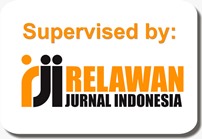FAKTOR PENENTU KESENJANGAN ANGGARAN
Abstract
An important aspect in the budgetsetting process is the tendency for budgeting managers to create budgetary slack. However, there is a limited study investigating the budgetary slack in non-profit oriented organization, such as local government. Therefore, this study address the gap in the literature by investigating the effect of budget participation and trust on budgetary slack. Besides, this study also analys the moderating effect of regulation understanding on the relationship the determinants (budget participation and trust) and budgetary slack. Final sample of this study is seven-eight (78) respondents who represented the lower level manager in organization. Structural equation model (SEM-PLS) is applied. The result show that only one hypothesis is accepted and other are rejected. the significant hypothesis is the effect of trust on budgetary slack. This study has practical and theoritical implication and it discussed in detail.
Keywords : budgetary participations, trust, regulation understanding, budgetary slackFull Text:
PDFReferences
Afifah, S. A. (2016). Pengaruh Pemahaman Regulasi dan Pengetahuan Anggota DPRD tentang Anggaran terhadap Penilaian Kinerja Anggaran Berbasis Value for Money. Skripsi.
Apriyandi. (2011). Pengaruh Informasi Asimetri Terhadap Hubungan antara Anggaran Partisipatif dengan Budgetary Slack: Studi Empiris pada Kabupaten Wajo. Skripsi.
Arikunto, S. (2006). Prosedur Penelitian Suatu Pendekatan Praktik. Jakarta: Rineka Cipta.
Arthaswadaya, A. (2015). Pengaruh Asimetri Informasi Terhadap Budgetary Slack dengan Self Esteem Sebagai Variabel Pemoderasi: Studi Eksperimen Dalam Konteks Penganggaran Partisipatif.Skripsi.
Basyir, A. A. (2016). Pengaruh Partisipasi Anggaran, Informasi Asimetri, dan Kapasitas Individu terhadap Budgetary Slack pada SKPD Pemerintah Kota Samarinda. AKUNTABEL: Jurnal Ekonomi Dan Keuangan,13(2).
Beritasumbar (2016). Penuh Keakraban Walikota Menyampaikan LKPJ. Berita Sumbar.http://beritasumbar.com/penuh-keakraban-walikota-sampaikan-lkpj-2016/. Diakses tanggal 15 Januari 2018.
Carreas, M. G., Gago, S., Gil, D. N. (2014). The Relationship between Trust and Budgetary Slack: an Empirical Study. Journal of Positive Management,5(1).
Chong, V. K., & Ferdiansah, I. (2011). The effect of trust-in-superior and truthfulness on budgetary slack: An experimental investigation.Advances in Management Accounting, 19.
Desriani, N. (2011). Pengaruh Tingkat Formalitas Penilaian Kinerja dengan trust Bawahan terhadap Atasan. Thesis.
Dianthi, I. A. G. P., & Wirakusuma, M. G. (2017). Pengaruh Partisipasi Penganggaran, Asimetri Informasi, Budaya Organisasi Dan Komitmen Organisasi Pada Senjangan Anggaran. E-Jurnal Akuntansi Universitas Udayana ISSN : 2302-8556, 18(2).
Dunk, A. S. (1993). The Effect of Budget Emphasis and Information Asymmetry on the Relation between Budgetary Participation and Slack. The Accounting Review, 68(2).
Ernayanti, N. P., & Dharmadiaksa, I. B. (2017). Pengaruh Partisipasi Penganggaran Pada Senjangan Anggaran dengan Karakter Personal Pesimis sebagai Variabel Pemoderasi. E-Jurnal Akuntansi Universitas Udayana, 19.
Firmansyah, R., Rosidi., & Ghofar, A. (2017). The Effect of Attribution Theory to The Budgetary Slack. Imperial Journal of interdisciplinary research, 3(3).
Fisher, J., Maines, L., Peffer, S. & Sprinkle, G. B. (2005). An Experimental Investigation of Employer Discretion In Employee Performance Evaluation And Compensation. The Accounting Review, 80(2).
Gago-Rodríguez, S., & Naranjo-Gil, D. (2016). Effects of trust and distrust on effort and budgetary slack: an experiment. Management Decision, 54(8).
Garrison, R. H., Noreen, E. W., & Brewer, P. C. (2013). Akuntansi Manajerial. Edisi 14. Jakarta: Salemba Empat.
Ghozali, I. (2011). Aplikasi Analisis Multivariate dengan Program IBM SPSS 19. Edisi 5. Semarang: Badan Penerbit Universitas Diponegoro.
Hansen, S. C., Otley, D. T., & Van der Stede, W. A. (2003). Practice Developments in Budgeting: An Overview and Research Perspective. Journal of Management Accounting Research, 15(1).
Hidayati, S., Basuki, P., & Pancawati, S. (2015). Pengaruh Partisipasi Anggaran, Pemahaman Penyusun Rencana Kerja Anggaran (RKA) dan Asimetri Informasi terhadap Efektivitas Anggaran SKPD Pemerintah Kota Mataram. Jurnal Investasi, 11(1).
Huseno, T. (2017). Organization Commitment And Environmental Uncertainty Moderating Budget Participation On Budgetary Slack. Journal of Applied Management, 15(1).
Ikhsan, A., & Ishak, M. (2005). Akuntansi Keperilakuan. Jakarta: Salemba Empat.
Jaya, M. F. D., Rahardjo, T. (2013). The Effects Of Budget Participation, Asymmetric Information, Budget Emphasis, And Organizational Commitment On Budgetary Slack In Pemerintah Kota Pasuruan. Jurnal Ilmiah Mahasiswa FEB, 1(2).
Milani, K. (1975). The Relationship of Participation in Budget-Setting to Industrial Supervisor Performance andAttitudes: A Field Study. The Accounting Review, 50(2).
Miyati. (2014). Pengaruh Partisipasi Anggaran Terhadap Budgetary Slack Dengan Pertimbangan Etika Sebagai Variabel Moderasi (Studi Empiris Pada Satuan Kerja Perangkat Daerah Kulon Progo).Skripsi.
Noviawati, I., & Utami, I. (2014). Pengaruh Locus of Control, Keadilan Distributif, Keadilan Prosedural dan Kepercayaan Terhadap Senjangan Anggaran. Economics and Business Research Festival.
Orinaldi, M., Tan, H. S., & Putra, W. E. (2017). Pengaruh Partisipasi Anggaran Dan Motivasi Terhadap Kesenjangan Anggaran Dengan Good Governance Sebagai Variabel Pemoderasi Pada Kepala Skpd Provinsi Jambi. Jurnal Akuntansi dan Keuangan Magister Ilmu Akuntansi Universitas Jambi, 2(3).
Putri, D. (2010). Pengaruh Kompetensi dan Motivasi Terhadap Kualitas Anggaran Dengan Regulasi Sebagai Variabel Moderasi Pada Pemerintah Daerah Kota Padang. Pascasarjana Fakultas Ekonomi, Universitas Andalas.
Ramadina, W. (2013). Pengaruh Partisipasi Anggaran Terhadap Senjangan Anggaran dengan Gaya Kepemimpinan dan Budaya Organisasi Sebagai Variabel Pemoderasi. Skripsi.
Romarina, A. (2010). Faktor-Faktor Risiko Fiskal dalam Penganggaran Daerah Faktor-Faktor Risiko Fiskal dalam Penganggaran Daerah. Jurnal BPPK, I(2).
Saputra, K. A. K. (2012). Analisis Pengaruh Locus of Control Terhadap Kinerja dan Kepuasan Internal Auditor dengan Kultur Local Tri Hita Karana Sebagai Variabel Moderasi. Thesis.
Savitri, E., & Sawitri, E. (2014). Pengaruh Partisipasi Anggaran, Penekanan Anggaran Dan Informasi Asimetri Terhadap Timbulnya Kesenjangan Anggaran. Jurnal Akuntansi, 2(2).
Shatrio, R. F., Yunilma & Putri, D. (2014). Pengaruh Etika, Komitmen dan Trust Terhadap Budgetary Slack.E-journal Uviversitas Bung Hatta,5(1).
Surjono, A., & Nugroho, T. T. (2008). Paradigma, Model, Pendekatan Pembangunan, dan Pemberdayaan Masyarakat di Era Otonomi Daerah. Malang : Bayumedia Publishing.
Tresnanty, A., & Widanaputra, A.A.G.P. (2015). Pengaruh Penganggaran Partisipastif terhadap Senjangan Anggaran dengan Kepercayaan Manajerial sebagai Variabel Intervening. E-journal Akuntansi Universitas Udayana, 13(3).
Ulyadi. (2016). Pengaruh Dua Dimensi Penganggaran Partisipatif Terhadap Slack Anggaran dengan Trust Sebagai Variabel Intervening. Jurnal Akuntansi Aktual, 3(4).
Warindrani. (2006). Akuntansi Manajemen. Graha Ilmu : Yogyakarta
Zand, D. E. (1972), Trust And Managerial Problem Solving. Administrative Science Quarterly, 17(1), 229-239.
DOI: https://doi.org/10.31846/jae.v9i1.367
Refbacks
- There are currently no refbacks.

This work is licensed under a Creative Commons Attribution-NonCommercial-NoDerivatives 4.0 International License.
e-Jurnal Apresiasi Ekonnomi Indexed by:












